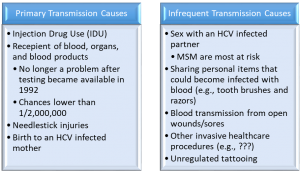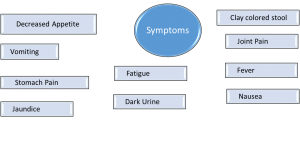HCV
HCV, also known as Hepatitis C or Hep C, is a blood-borne virus. This virus is typically contracted from the sharing of needles; this primarily affects those who inject drugs2. Some find that HCV is a short-term illness due to their immune systems being able to fight the virus. However, 70 to 85% of those infected have a chronic infection. This can lead to long-term health consequences such as cirrhosis, and liver failure. Consequences are most common in those who the infection is not identified and treated. Many who are infected with Hepatitis C do not realize they have the virus because they do not feel sick2. See below for symptoms of HCV.
Prevention for HCV involves not sharing needles as there is no vaccine for HCV 2.
Hepatitis C Questions and Answers for Health Professionals. (2018, April 30). Retrieved from https://www.cdc.gov/hepatitis/hcv/hcvfaq.htm#section1
Hepatitis C Questions and Answers for Health Professionals. (2018, April 30). Retrieved from https://www.cdc.gov/hepatitis/hcv/hcvfaq.htm#section1
Treatment and Cure
In 2011 the HCV protease inhibitor therapies were introduced1. This therapy can “cure” HCV with 8 to 12 weeks of therapy. This works for over 90% of HCV cases regardless of the strain. There have been developments since and are sure to be more in the future1. For more information on the treatment for acute and chronic Hepatitis C, please visit https://www.hcvguidelines.org/.
Facts on Hepatitis C
- As of 2015 3.5 Million people are estimated to be infected with HCV 1
- 15-20% of infections are cleared by people’s bodies without requiring treatment1
- Researchers are unsure why this happens
- Once this happens it is still possible to get infected with the same or different strain of HCV1
- 75 to 85% of HCV cases become chronic 1
- 10 to 20% of those with chronic HCV will develop liver cirrhosis
- HCV is a common cause of liver transplant 1
- It is estimated that 50% to 90% of intravenous drug users with HIV also have HCV
References
- Hepatitis C Questions and Answers for Health Professionals. (2018, April 30). Retrieved from https://www.cdc.gov/hepatitis/hcv/hcvfaq.htm#section1
- HIV/AIDS and Viral Hepatitis. (2018, March 7). Retrieved from https://www.cdc.gov/hepatitis/populations/hiv.htm


